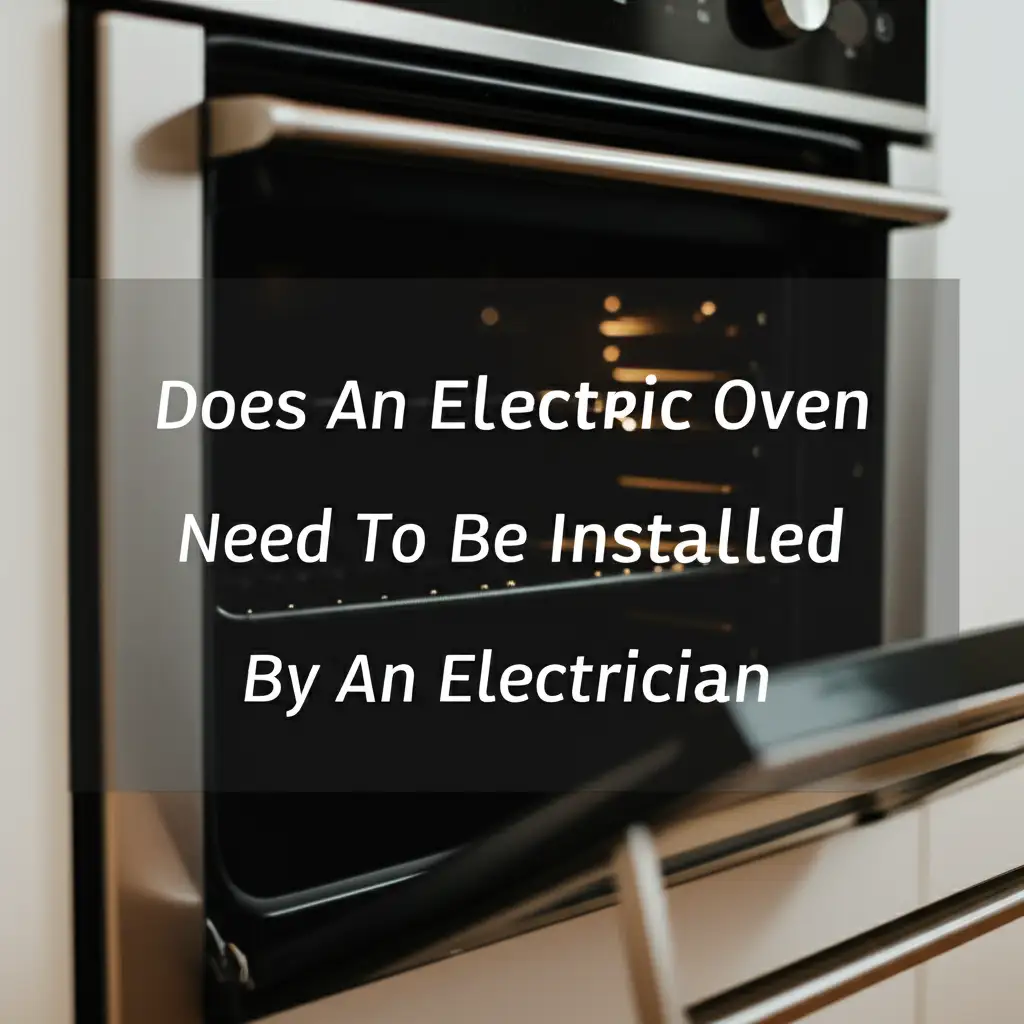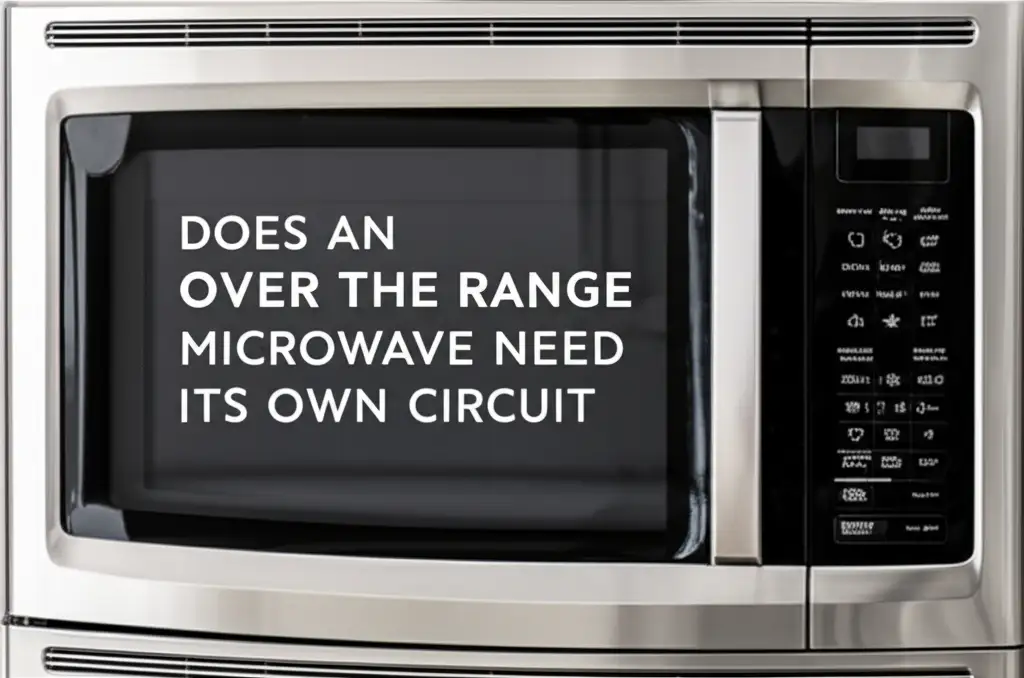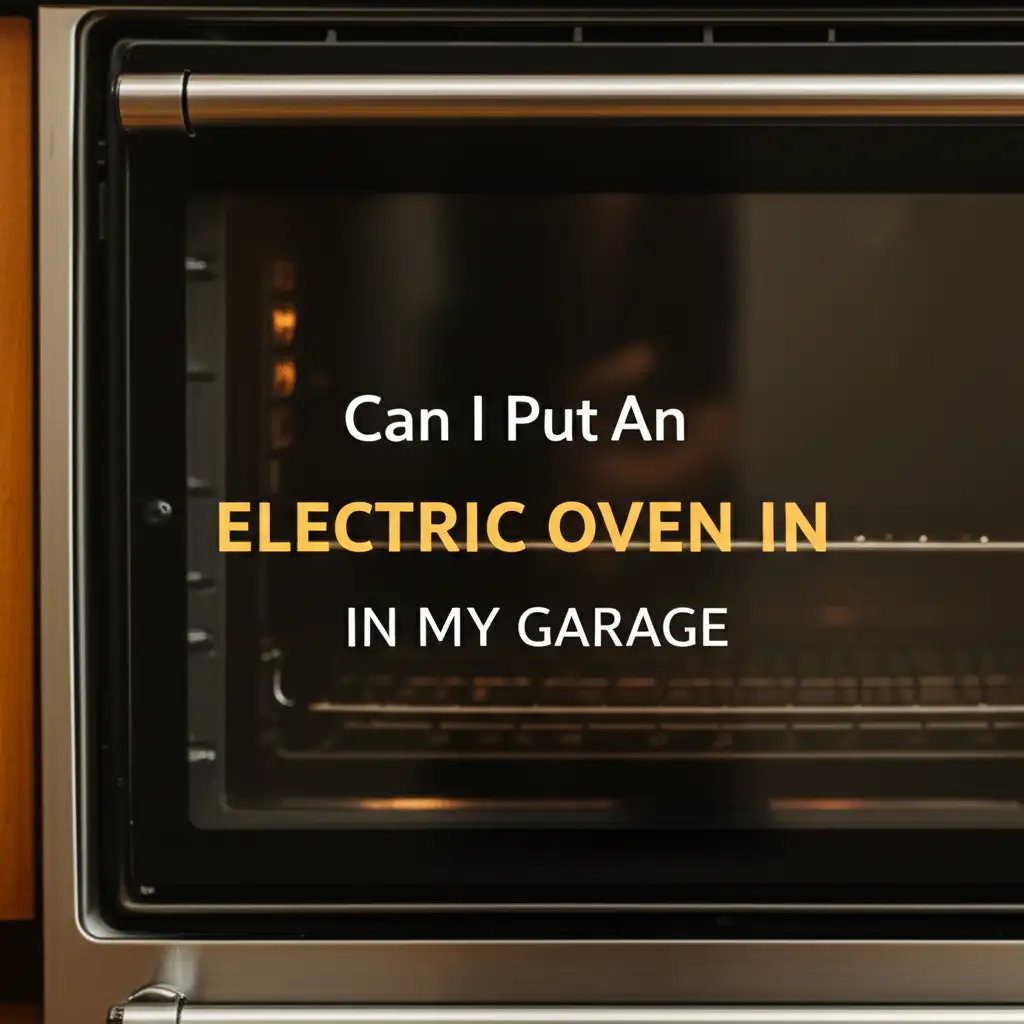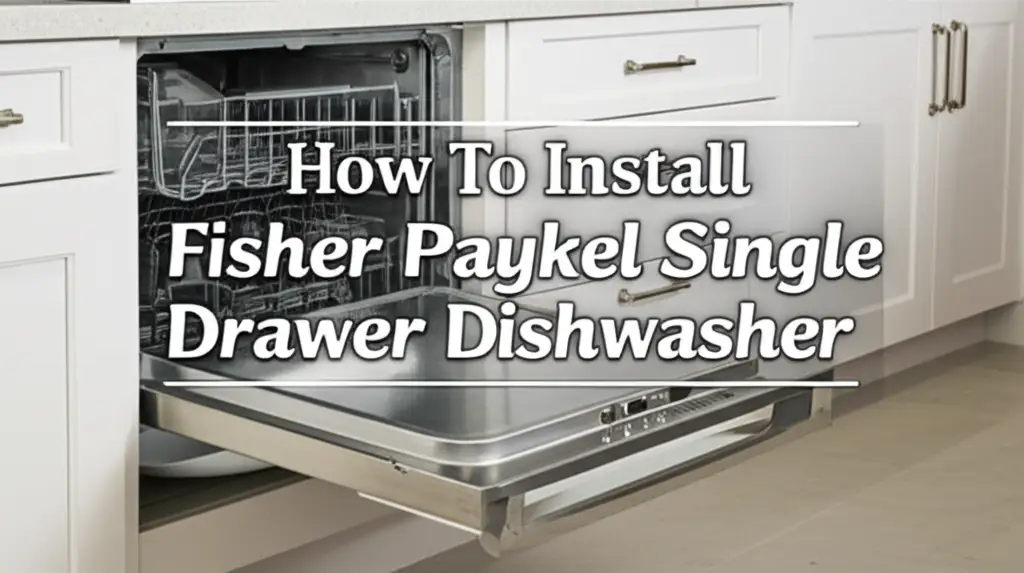· Todd Martin · Home Appliances · 13 min read
Does An Electric Oven Need To Be Installed By An Electrician

Electric Oven Installation: Do You Need an Electrician?
Bringing a new electric oven into your home is an exciting moment. You imagine delicious meals and family gatherings around your kitchen. However, before you plug in or hardwire your new appliance, a vital question often arises: Does an electric oven need to be installed by an electrician? This query is more important than you might think. Improper electric oven installation can lead to serious hazards.
We will explore the specific electrical needs of electric ovens. We will discuss when a Do-It-Yourself approach might be possible. More importantly, we will highlight the critical safety reasons for hiring a professional. Understanding electrical codes and risks helps you make an informed decision. This article helps you understand the steps for a safe and compliant electric oven setup.
Takeaway
Installing an electric oven safely and correctly often requires a professional electrician. Consider these key points:
- Voltage Needs: Most electric ovens use 240-volt power. Standard home outlets provide 120 volts.
- Dedicated Circuits: Ovens need their own high-amperage circuit. This prevents overloads.
- Hardwired vs. Plug-in: Hardwired ovens require direct electrical connections. Plug-in models use specific outlets.
- Electrical Codes: Local building codes dictate safe wiring practices. These codes protect your home.
- Safety Risks: Incorrect wiring can cause fires, electric shock, or damage to the appliance.
Clear Answer: Yes, an electric oven generally needs to be installed by an electrician. Most electric ovens require a dedicated 240-volt circuit and specific wiring. This type of electrical work is complex. It carries significant safety risks if done incorrectly. A qualified electrician ensures your installation meets safety standards and local electrical codes.
Understanding Electric Oven Electrical Requirements
Electric ovens are powerful appliances. They do not run on standard wall outlets. Most homes have 120-volt outlets, which power smaller devices. Electric ovens, however, demand much more energy. They typically require a 240-volt electrical supply. This higher voltage allows them to generate the heat needed for cooking.
This power requirement means a standard 120-volt outlet will not work. You need a dedicated circuit. This circuit has its own breaker in your electrical panel. It is designed to handle the high amperage of the oven. Common amperages for electric ovens range from 30 amps to 50 amps. The correct wire gauge must be used for these high-amp circuits. Thinner wires cannot safely carry the current. They can overheat.
Some electric ovens come with a power cord and a matching plug. These plugs are large and have three or four prongs. They fit into a special 240-volt receptacle. Other ovens are “hardwired.” This means they connect directly to your home’s electrical system. There is no plug. This type of connection requires precise wiring work.
The type of oven determines the exact electrical setup. My experience shows that dealing with 240-volt wiring is different from simple plug-ins. Incorrect wiring can cause many problems. It can lead to power fluctuations or even serious electrical events.
When DIY Oven Installation Might Be Possible
In very specific situations, a homeowner might install an electric oven themselves. This is usually only true for direct replacements. The new oven must match the old oven’s electrical connection exactly. For example, if your old oven used a 240-volt plug and the new oven uses the same plug type, you might be able to simply unplug the old one and plug in the new one.
This scenario assumes several important factors. Your existing outlet must be in perfect condition. It must be wired correctly. The circuit breaker must be the right size. The wire gauge must be appropriate for the new oven’s electrical load. Any change to these factors makes DIY installation risky. Most modern electric ovens, especially built-in or range models, require more than just plugging them in. They often need hardwired connections or specific outlets that require professional setup.
Consider the case of other appliances. For example, a dishwasher receptacle needs to be GFCI in some locations. This shows how specific electrical requirements exist for different home devices. While some minor appliance tasks can be DIY, high-power appliances like ovens are different. If you replace an old 3-prong oven with a new 4-prong oven, the outlet must be updated. This update is a job for an electrician. It involves changing the receptacle and possibly the wiring to comply with current electrical codes.
I always advise caution here. Even if it seems simple, hidden issues can exist. These issues often become clear only when problems arise. If you feel unsure about any electrical connection, stop and call a professional. Your safety is most important.
The Critical Role of Electrical Safety in Oven Installation
Electrical safety is paramount when installing an electric oven. Electricity can be dangerous. Improper handling can cause serious injury or death. An electric shock can be fatal. This risk is very high with 240-volt appliances. These systems carry high current.
Fires are another major concern. Loose connections can create resistance. This resistance generates heat. If this heat is too much, it can ignite nearby insulation or building materials. Incorrect wire gauges also pose a fire risk. Wires too small for the current will overheat. This overheating can melt insulation and start a fire inside your walls.
Proper grounding is essential for safety. Grounding provides a safe path for electricity to flow if there is a fault. Without proper grounding, a faulty appliance can become energized. Anyone touching it could receive a severe shock. Modern ovens often require a four-wire connection. This includes two hot wires, a neutral wire, and a ground wire. Older homes may only have three-wire setups. Updating this wiring is necessary for modern safety standards.
Electrical safety also involves proper circuit breaker sizing. The breaker protects the circuit from overcurrent. If the oven draws too much power, the breaker should trip. This cuts off power and prevents damage or fire. An undersized breaker will trip often. An oversized breaker will not trip when needed. This allows too much current to flow, creating a fire hazard. My personal rule is: when in doubt about electrical safety, consult a licensed electrician. They know the risks and how to mitigate them.
Navigating Electrical Codes and Permits for Appliances
Understanding electrical codes is a key part of safe electric oven installation. These codes are not just guidelines; they are legal requirements. They ensure electrical systems are safe and reliable. The National Electrical Code (NEC) sets standards for electrical installations in the United States. Many local jurisdictions adopt the NEC. They may also add their own specific rules.
Compliance with these codes is vital. An oven installation that does not meet code requirements can pose serious dangers. It can also lead to problems when selling your home. Home inspectors check for code compliance. Insurance companies might deny claims related to electrical fires if the installation was not up to code. My observation is that many DIY electrical jobs fall short here. It is hard for someone without specialized training to know all code rules.
Some electrical work requires a permit. This is often true for new circuit installations or major upgrades. When you install a new oven that needs a new 240-volt circuit, you likely need a permit. This permit ensures the work is inspected by a city official. The inspection verifies that the electrical work meets safety and code standards. Skipping permits and inspections saves money in the short term. However, it creates big risks. These risks include fines, having to redo the work, and potential safety hazards.
Comparing this to other appliance installations can be useful. For instance, there are rules about how an electric dryer needs to be positioned, such as 18 inches off the ground in some contexts. These rules exist for safety and practical reasons. Similarly, electrical codes for ovens protect against electrical dangers. A qualified electrician stays updated on all local and national electrical codes. They ensure your oven installation is legal and safe. This avoids future headaches and potential dangers.
Potential Risks of Improper Electric Oven Installation
Improper electric oven installation carries severe risks. These risks affect both your safety and your property. Understanding them helps reinforce the need for professional help. The most immediate dangers include fire and electric shock. Incorrect wiring can lead to short circuits. Short circuits cause sparks and extreme heat. This can quickly ignite nearby combustible materials.
Electric shock can happen if wires are exposed or improperly insulated. Touching a live wire can send high voltage through your body. This can cause severe injury, internal organ damage, or even death. Without proper grounding, the entire metal casing of the oven could become energized. Anyone touching it would be at risk. This is a very serious concern.
Beyond immediate safety, improper installation can damage your new appliance. Incorrect voltage or amperage can ruin the oven’s internal components. This could void the manufacturer’s warranty. It means you would be responsible for costly repairs or replacements. My experience shows that appliance warranties are strict about proper installation. If a problem arises, the first thing they check is the installation method.
Moreover, faulty wiring can lead to chronic electrical problems in your home. Circuits might trip frequently. Lights might dim when the oven turns on. These are signs of an overloaded or improperly wired system. These issues reduce your home’s electrical reliability. They can also create ongoing safety hazards. Your home insurance might also be affected. If an electrical fire occurs due to unpermitted or non-code-compliant work, your insurance claim could be denied. This leaves you to bear the full financial burden of damages.
The Benefits of Hiring a Qualified Electrician for Oven Hookup
Hiring a qualified electrician for your electric oven installation offers many benefits. The most important benefit is safety. Electricians understand electrical systems. They know how to handle high voltage safely. They use the correct tools and follow strict safety protocols. This protects your home and your family from electrical hazards.
An electrician ensures compliance with all electrical codes. They know the latest NEC standards and local regulations. They obtain necessary permits. They arrange for inspections. This guarantees your oven installation is legal and up to safety standards. My work with home systems consistently shows that code compliance adds long-term value and safety. It also avoids problems during future home sales.
Professional installation prevents damage to your appliance. Electricians connect wires correctly. They ensure proper voltage and amperage. This protects your oven’s internal components. It also maintains your warranty. Many manufacturers require professional installation for warranty validity. An electrician’s work is typically covered by their own warranty. If an issue arises from their installation, they fix it.
Hiring an electrician saves you time and effort. Electrical work is complex and time-consuming for someone without experience. Electricians work efficiently. They complete the job quickly and correctly. This means you can start enjoying your new oven sooner. You gain peace of mind knowing the job is done right. You avoid the stress and potential dangers of DIY electrical work. It is a worthwhile investment for safety and proper function.
Choosing the Right Electrician for Appliance Installation
Selecting the right electrician is crucial for a successful electric oven installation. Not all electricians specialize in appliance hookups. Look for a licensed electrician. Licensing proves they have met specific training and examination requirements. It shows they understand electrical theory and practical applications. My research indicates that a licensed professional is always the best choice for such critical work.
Check for proper insurance. A reputable electrician carries liability insurance. This protects you in case of accidental damage to your home during the installation. It also covers any injuries that might occur on your property. Never hire an uninsured contractor. The risk is too high.
Seek an electrician with experience in appliance installation. Ask them about their specific experience with electric ovens. They should be familiar with 240-volt systems and dedicated circuits. They should also know the differences between hardwired and plug-in oven installations. A good electrician can explain the process clearly. They can answer your questions.
Ask for references. Speak to past clients. Inquire about their satisfaction with the work, timeliness, and professionalism. Get a clear, written quote before work begins. This quote should detail all costs. It should include labor, materials, and any permit fees. Avoid electricians who give vague estimates or demand full payment upfront. A detailed quote helps prevent unexpected charges. A professional electrician provides transparent pricing and reliable service.
FAQ Section
Q1: What power supply does an electric oven need?
An electric oven typically needs a 240-volt electrical supply. This is different from the standard 120-volt outlets found throughout your home. Ovens also require a dedicated circuit. This means they have their own circuit breaker in your electrical panel. The circuit’s amperage rating must match the oven’s requirements, usually 30 to 50 amps.
Q2: Can I replace my old electric oven myself?
You might replace an old electric oven yourself only if it is a direct plug-in replacement. The new oven must use the same type of 240-volt plug and outlet as the old one. If the connection is hardwired, or if the plug type or wiring needs updating, an electrician is necessary. DIY attempts on hardwired ovens or incompatible plug types are highly risky.
Q3: What are the risks of DIY electric oven installation?
The risks of improper DIY electric oven installation are significant. They include electric shock, fire hazards due to faulty wiring, and damage to the appliance itself. Incorrect wiring can also lead to tripped breakers or an overloaded electrical system. Furthermore, non-compliant installations can violate local electrical codes and void home insurance coverage.
Q4: How much does an electrician charge to install an oven?
The cost to install an electric oven varies widely. It depends on several factors. These factors include your location, the complexity of the installation, and whether new wiring or a dedicated circuit is needed. Simple plug-in replacements might cost less. Installations requiring new circuits or panel upgrades will be more expensive. Get multiple quotes.
Q5: Is special wiring needed for an electric oven?
Yes, special wiring is needed for an electric oven. Standard 120-volt wiring is too small. Electric ovens require larger gauge wires. They need a dedicated 240-volt circuit. This circuit typically uses three or four thick wires, including a ground wire. The wiring must be able to safely handle the high current demands of the oven.
Q6: Do new ovens come with a power cord?
Many new electric ovens do not come with a power cord. This is because different homes have different types of 240-volt receptacles (3-prong or 4-prong). You usually need to purchase the correct power cord separately. An electrician can help you determine the right cord type and ensure it is properly connected to the oven and the wall outlet.
Conclusion
Installing an electric oven is not a simple task. It demands a deep understanding of electrical systems and safety protocols. Most modern electric ovens require a dedicated 240-volt circuit. They often need specific wiring or even hardwired connections. Attempting this without proper electrical knowledge creates significant risks. These risks include electric shock, fire, and potential damage to your home and appliance.
Hiring a qualified electrician ensures your electric oven installation is safe. It guarantees compliance with all local and national electrical codes. An electrician brings expertise and peace of mind. They know how to correctly size circuits, select appropriate wiring, and establish proper grounding. They navigate permits and inspections. This protects your investment and, more importantly, your family’s safety. When considering your new electric oven, choose safety and compliance. Contact a licensed electrician today to handle the installation. Ensure your kitchen is ready for safe and delicious cooking for years to come.
- electric oven installation
- electrician required
- electrical safety
- oven wiring
- appliance installation
- electrical code
- DIY oven install
- home electrical
- kitchen appliances





